How to start a food business—three successful entrepreneurs on achieving a profitable, sustainable future
Three foodies talk about their journey learning how to start a food business, and how they put the health of the planet at the heart of their endeavor
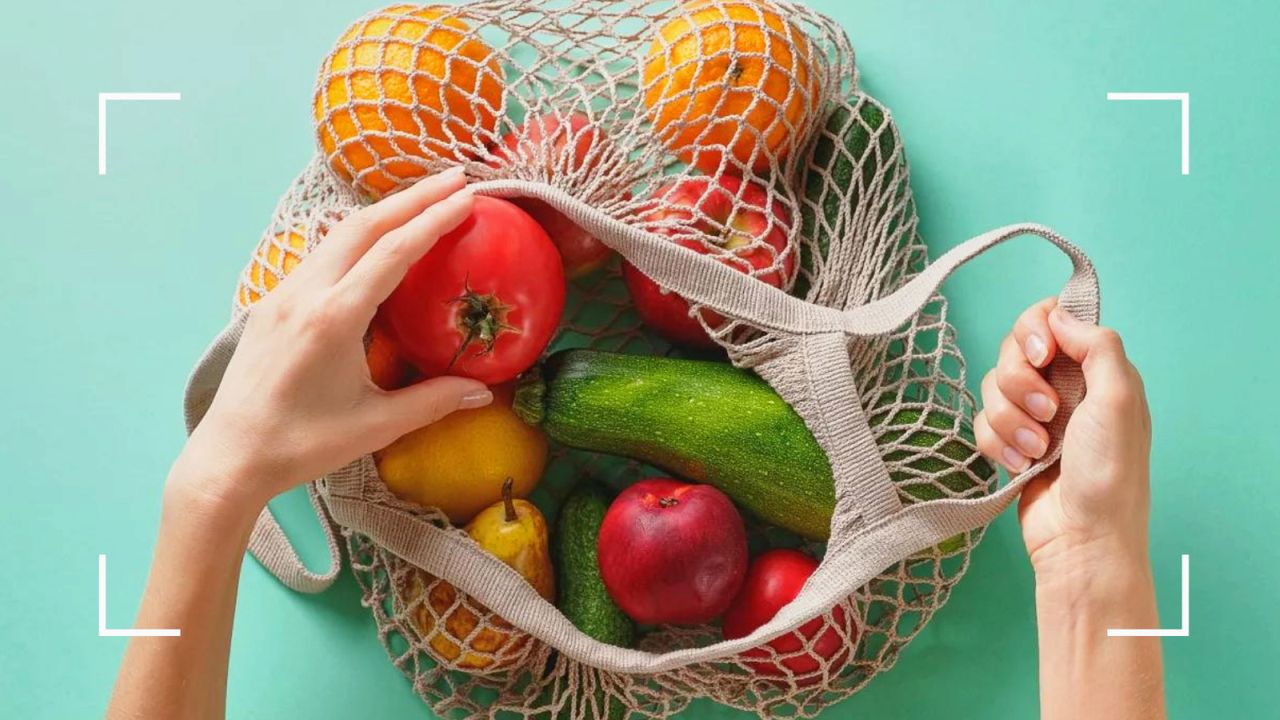
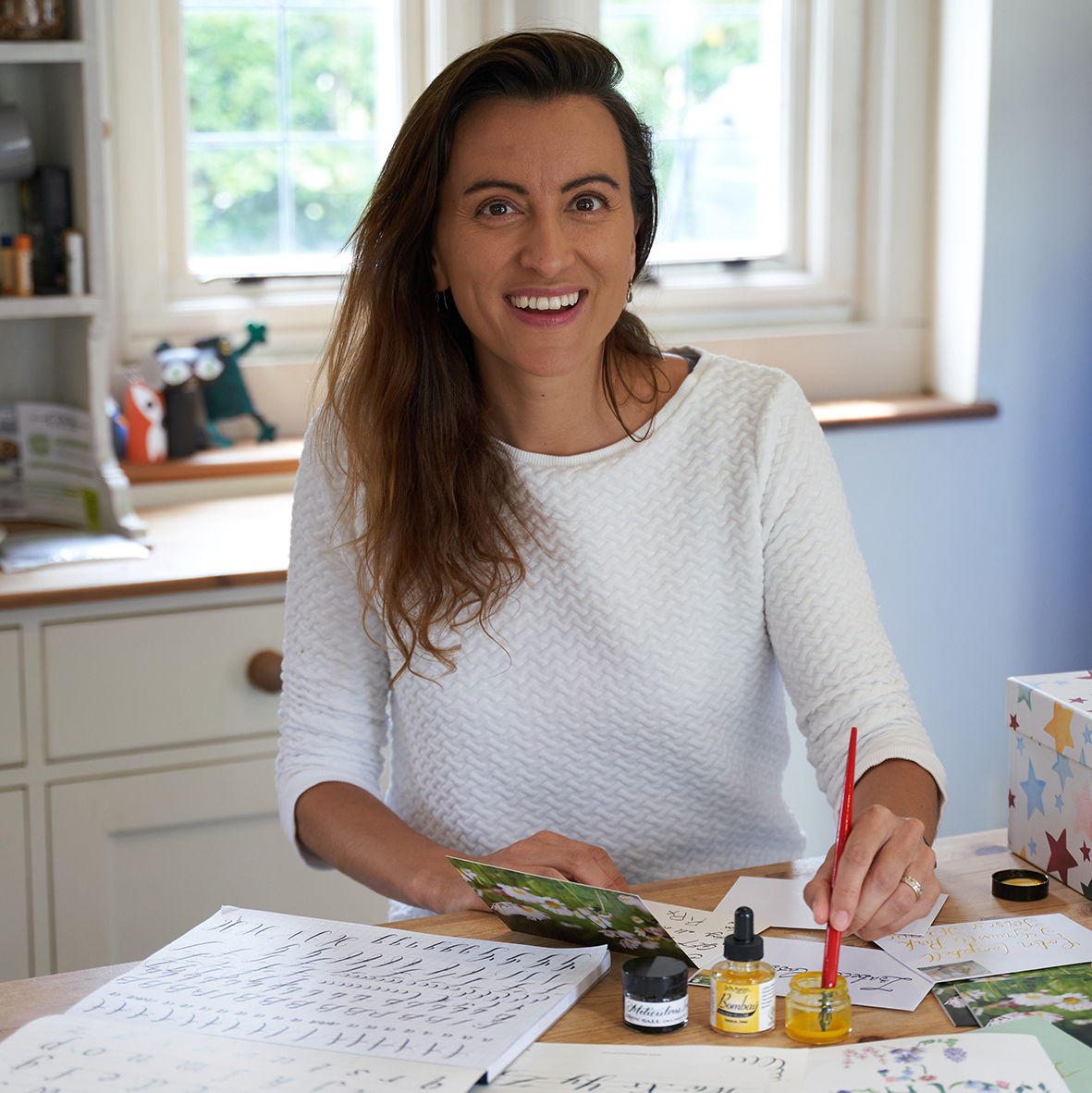

Our Brand New Directions series takes a look at inspiring businesswomen and how they got started setting up their own companies. We delve into the costs involved in realizing their dreams, and the brilliant achievements won through their hard work.
We asked three successful businesswomen how to start a food business. These entrepreneurs have tapped into the need for more eco-friendly food choices with a commitment to supplying delicious food sustainably.
But how much does it cost to set up a food business and what are the secrets to finding success? If you've got a bright idea for a new food venture, take note of how these women made their business idea a reality—with one woman turning over a staggering $3 million/£2.2 million last year.
If you find the entrepreneurial aspect of this subject interesting, you might also want to read our guides to how to start a home delivery business, and how to start a beauty business.
How to start a food business from home
We asked three women about how they started a food business from home, including the upfront costs, challenges along the way, and their key takeaways from the process. They get candid about the steepest learning curves they faced, how the pandemic affected them, and what the future holds for their businesses—as well as that breakthrough moment on the way to success.
Oggs owner Hannah Carter
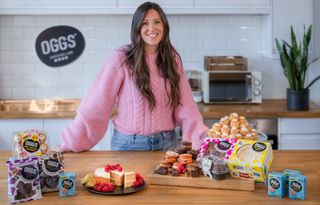
Hannah Carter, 39, from London, is the founder of Oggs, which makes aquafaba, a vegan alternative to eggs. Her company now turns over $3 million/£2.2 million a year.
THE FOOD BUSINESS IDEA
After watching Cowspiracy in 2016, I knew the biggest impact I could have on the planet and animal welfare was to go vegan (take a look at w&h's guide to vegan protein if you're looking to make some swaps). But blueberry muffins were my Achilles heel. I tried home- baking, but without eggs, I could not master a muffin.
Sign up for the woman&home newsletter
Sign up to our free daily email for the latest royal and entertainment news, interesting opinion, expert advice on styling and beauty trends, and no-nonsense guides to the health and wellness questions you want answered.
Experimenting led me to aquafaba—the water drained from canned chickpeas and other legumes—which bakers use as an alternative to eggs to bind ingredients. The problem was it worked brilliantly sometimes, but failed miserably other times.
"There were no plant-based cake brands in the aisles before us"
Aquafaba did not exist as a standalone product, so you had to drain a can of chickpeas every time. I was sure that if I could produce aquafaba at scale, and it worked perfectly every time, chefs, vegans, and the vegan-curious would all be interested.
Business Breakdown

Start-up costs: $415,000/£300,000
Comprising of...
● Research and Development: $138,000/£100,000
● Manufacturing: $138,000/£100,000
● Marketing: $138,000/£100,000
Annual turnover: $3 million/£2.2 million
Website: loveoggs.com
WHAT HAPPENED NEXT
After five months of research, Polly Mason came on board as a co-founder. While I chat to investors and pitch to supermarkets, Polly is paying huge attention to detail in production and development.
It took 18 months to create a consistent aquafaba and—in July 2018—we secured our patent. I put my savings into getting the concept approved, then angel investors raised our start-up costs.
THE BREAKTHROUGH MOMENT
We asked a bakery to experiment with our aquafaba and it created amazing cakes. So in November 2018, we pitched our Zesty Lemon, Chocolate Fudge, and Victoria Sponge cakes to supermarkets. There were no plant-based cake brands in the aisles, so it was incredible when, by June 2019, we launched our cakes in 900 Waitrose and Sainsbury’s stores.
STEEPEST LEARNING CURVE
The scientific process of perfecting aquafaba required the help of two universities. I had no idea how complex it was going to be, but the challenge made its success all the more rewarding.
WHERE WE ARE NOW
We’ve now added Millionaire Bites and Brownie Bites, and our cakes are also available in Co-op, Ocado, Asda, and Tesco. In July last year, we launched our aquafaba in Waitrose, then Sainsbury’s, Asda, and Co-op. In early 2022 we’ll launch a scrambled egg alternative, used for omelets and quiches.
As a sustainable business, we measure our success in the amount of CO2 saved and eggs removed from the food chain. We have prevented the use of more than one million eggs, resulting in a reduction of over 226 tonnes of CO2—the equivalent of driving around the world 51 times. We’ve swapped from soy to oat milk to reduce food miles and land use, and products are made in bakeries and factories using 100% renewable energy. Wrappers and trays are biodegradable or compostable. Our success is all down to the fact so many people are keen to make the animal-friendly, planet-friendly choice.
THE SECRET TO SUCCESS
Find people who champion what you believe in, but who can do things you can’t. The business will grow if you get it right.
Mandira’s Kitchen owner Mandira Sarkar
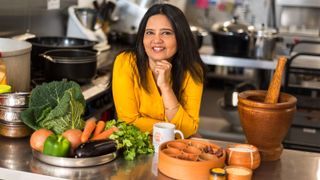
Mandira Sarkar, 50, is the founder of Mandira’s Kitchen, and lives in Surrey with husband Samin, 56, and daughter Mahera, 19.
THE FOOD BUSINESS IDEA
When I moved to the UK from India 20 years ago, I missed our family cook more than I missed my parents. So over the years, I learned to recreate the wholesome foods I’d grown up loving.
In 2015, my management consultancy contract came to an end. Then a friend invited me to visit her eco-friendly hotels in India, where local women cooked guests traditional meals. Inspired by this experience, I invested $1,040/£750 in copper thalis for cooking and started running supper clubs at home. It was the start of my sustainable business.
"Sustainability is at the heart of our company because the planet will not support unsustainable businesses"
WHAT HAPPENED NEXT
The supper clubs were popular and I started catering for small events too. I batch-cooked and froze meals, then approached local farm shops, but the response was hesitant—people thought if their customers wanted Indian options, they’d get a takeaway. I had to keep explaining my food was different.
Business Breakdown
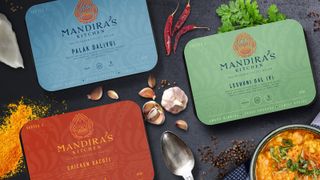
Start-up costs: $80,000/£57,700
Comprising of...
● Barn renovation: $60,000/£43,000
● Kitchen equipment: $4,150/£3,000
● Insurance: $2,800/£2,000
● Utilities: £970/£700
● Branding: $5,534/£4,000
● Website: $6,900/£5,000
Annual turnover: $421,000/£305,000
Website: mandiraskitchen.com
By the end of 2016, a few farm shops were stocking my meals, so I built a commercial kitchen in our garden. After a year, I needed a proper venue and a bigger team. When I found a 400-year-old derelict cowshed, I found the future home of Mandira’s Kitchen.
Samin (my husband) put part of his pension into the renovation and 2,500 people attended our May 2019 launch, where we served 4,000 samosas! Every dish is made in small batches without preservatives, then blast-frozen to secure the flavor and nutrition.
THE BREAKTHROUGH MOMENT
When lockdown saw our catering diary empty, it was terrifying. To survive, we needed 500 customers to buy eight meals a month, so I invested $19,429/£14,000 in the website. By July we were taking $13,878/£10,000 a month online. I like to say I never need an umbrella because I believe in eternal sunshine, but it was such a relief to know that we were going to survive.
STEEPEST LEARNING CURVE
I am impatient, so patience has been an important value to nurture. Also, I had to let go of trying to run every aspect of the business myself.
WHERE I AM NOW
I’m proud to employ an all-female team. I love giving women opportunities, whether it’s a teenager’s first job or an older woman’s second career.
Sustainability is at the heart of our company because the planet will not support unsustainable businesses. We use no single-use plastic—meal trays are plastic-free and biodegradable, and the sleeves are non-laminated cardboard. We use fresh, seasonal ingredients, grown within a 50-mile radius where possible. My goal is to get our meals into 500 UK farm shops.
People can order online or pop in for a freshly-brewed pot of chai tea. My dream is that when people want an Indian meal made with love and fresh ingredients, in small batches from old family recipes, they come to us.
THE SECRET TO SUCCESS
Try to surround yourself with the best people, who bring the most positive vibes. And test the market at every stage!
Rosie’s Preserving School's Rosie Jameson
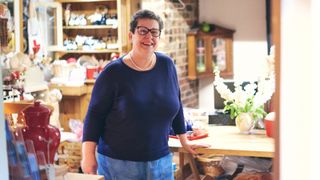
Rosie Jameson, 67, is the founder of Rosie’s Preserving School. She lives in Rutland, East Midlands, with her husband Trevor, 55, and hens Belle and Emmy.
THE FOOD BUSINESS IDEA
By the time I started school, I was already a jam-maker, assisting my mum by passing her waxed discs and rubber bands. The joy of preserving comes from a deep need to survive and provide, yet be frugal. It’s an ideal way to avoid food waste, as it’s about using seasonal ingredients, which can then be eaten all year round—so it formed the start of my sustainable business.
"Preserving is an ideal way to avoid waste"
Fifteen years ago I started a small shop, Rosie Makes Jam, and also launched Love Jars, an online shop for preserving kits. But in 2017, when I was diagnosed with breast cancer, I took two years out, to evaluate the best use of my time. Then came the pandemic. We saw a huge rise in equipment sales and a clamoring for advice, so I mothballed my shop and started teaching via Zoom.
Business Breakdown
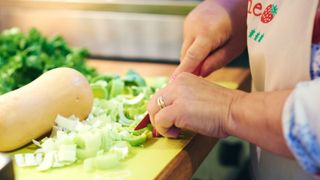
Start-up costs: $3,500/£2,500
Comprising of...
● Ingredients and class planning: $1,380/£1,000
● Photography: $2,075/£1,500
Projected annual turnover: $17,300/£12,500
Website: rosiemakesjam.com
WHAT HAPPENED NEXT
In 2020, I scheduled a course of six workshops and had 20 people sign up from the UK, Australia, America, and Brazil. The ingredients and equipment were emailed in advance, so people could cook along in their own homes. The concept was hugely popular and so Rosie’s Preserving School was born.
People could ask questions and show what they’d made. Requests for more workshops followed, so I devised a new syllabus for 2021 and beyond.
THE BREAKTHROUGH MOMENT
I tried to film YouTube videos in the past, but it felt artificial. With Zoom, I found my calling. I worried I couldn’t fill 90 minutes, but even for a recipe such as orange, rosemary, and thyme salt, I can talk for an hour!
STEEPEST LEARNING CURVE
I had to think about what would be in season months in advance and consider alternative ingredients for people in other climates. In classes, I learned to slow down, as students were cooking at their own pace.
WHERE I AM NOW
I was lucky to survive cancer and thrilled it led to a new path. Coming up we have classes in piccalilli, spiced apple chutney, plums in brandy, and food Christmas gifts. I’m aiming for 100 students in every class. I feel so connected to them all by our shared love of food preservation.
THE SECRET TO SUCCESS
Invest in good photos, and don’t say no to a new idea without asking yourself if it's a good one.
YOU MIGHT ALSO LIKE

● How to start an ethical beauty business
● What it's really like to launch a home-delivery business
● How to start a flower business according to three entrepreneurs
Whether you decide to learn how to make candles, have a go at flower arranging, or take up tapestry, it's worth considering whether your new passion could become a lucrative business venture. It's now easier than ever to start a business from home and spread the word far and wide, thanks to the power of social media.
Of course, there is something to be said for enjoying a hobby in its own right as a way to relax and unwind without thinking of it as a business opportunity, but if you do want to explore monetizing your skills, these success stories show that it's possible to take your idea from the kitchen table to market and thrive.
If you're feeling inspired to try something new, check out our list of the best hobbies for women, which offers tips and ideas for getting started with practicing yoga, crafts, photography, and fermenting to name just a few.

Kim has been writing about the incredible lives and adventures of amazing women and brave children (and, occasionally, men too!) for nearly 20 years. A freelance writer who has written for all the best women’s magazines, Kim specialises in covering women’s health, fitness, travel, family, relationships and business themed stories. She counts herself very lucky to have written about so many interesting people over the years.
-
 The rise of grey divorce: 'It was hell after 40 years of marriage - but now I'm loving life'
The rise of grey divorce: 'It was hell after 40 years of marriage - but now I'm loving life'‘Grey divorce’ is on the rise, but experts say there's no reason why you can't start again later in life
By Kerry Law Published
-
 Household items you should clean more regularly
Household items you should clean more regularlyThink you're cleaning enough? Think again! Everyday items harbour hidden bacteria, some worse than a toilet seat, here’s what you’re missing…
By Natalie Denton Published
-
 How to turn ethical beauty into a business—three women share their tips and successes
How to turn ethical beauty into a business—three women share their tips and successesTo prove ethical beauty is a business winner, we spoke to three champions of sustainability
By Kim Willis Published
-
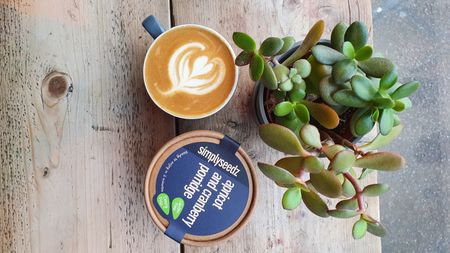 What it's really like to launch a home-delivery business: 3 entrepreneurs share their stories
What it's really like to launch a home-delivery business: 3 entrepreneurs share their storiesHome deliveries have become a winning business for these three women
By Kim Willis Published